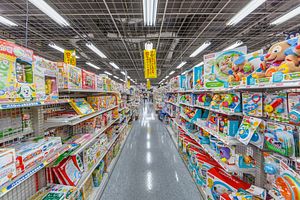With the issue of his new Cabinet settled, Prime Minister Shinzo Abe will now likely focus much of his domestic attention on the decision to increase the consumption tax again, as this will have a significant effect on the country’s long-term financial prospects and the efficacy of his three-pronged economic policy, dubbed Abenomics. The consensus among industry analysts is that Abe will decide by December whether to increase the tax from 8 to 10 percent in October 2015.
This theoretically leaves him with at least three months to make his decision, yet many will be watching closely to see if he sticks with his commitment to raise taxes in what is seen as an effort to come to terms with Japan’s massive national debt. On the other hand, the tax increase in April sent a shock through Japan’s nascent economic recovery not seen since the economic downturn in 1997 following the previous consumer tax hike. Abe will be walking a fine line between reassuring the markets about his fiscal policy while attempting to keep the economic growth brought about by Abenomics intact.
After the announcement of his Cabinet, Abe said the new government “will analyze calmly and act appropriately,” according to the Jiji Press, and “We will make a judgment after examining economic conditions in a comprehensive manner,” specifically after Japan’s third quarter economic figures are reported. If Japan’s economy performs as many expect and returns to an acceptable growth level, after contracting by 6.8 percent in the second quarter, then Abe will likely feel that Japan’s economy successfully weathered the trauma of the initial tax hike and could support a further 2 percent increase.
Most of the involved ministers in the previous Cabinet supported the second tax increase as recently as last week. The previous Vice Economy Minister Yasutoshi Nishimura told Reuters that the increase was still part of the government’s “basic stance,” and that failing to do so “would deal a considerable blow to the economy.” The Economy Minister Akira Amari said a failure to raise the tax “would hurt confidence in Japan’s government debt.” The finance ministry and Bank of Japan are also still in favor of the increase because it will both provide for an eventual balanced budget and keep the bond market stable.
Japan is able to maintain its current debt burden primarily through low interest rates on government bonds. The government is able to service the interest on that debt at current rates, however failure to provide for long-term fiscal stability through the proposed tax hike could spook investors and cause them to start selling their debt, which in turn could drive up the interest rate.
Senior staff writer for the Nikkei, Yoichi Takita, wrote an article today postulating that Abe will use his political capital to spur the economy. This political capital could be generated by the new Cabinet, which managed to balance the different factions within the LDP, as well as from other potential sources like a possible sideline summit with Chinese President Xi Jinping at the upcoming APEC meeting in November. The new balanced Cabinet would theoretically allow for the government to avoid infighting and take a decisive, unified approach to economic policy, while a summit with Xi would improve ties with China, which in turn could ameliorate some of the negative economic impact on their trade and investment relationship that has steadily worsened since the Senkaku/Diaoyu Island dispute was rekindled in August 2012.
Reducing regional tension and allowing the new government to focus more on economic concerns as opposed to security would certainly be beneficial, however that may not be enough to ensure the economy successfully rebounds in the third quarter. An estimate by eight private think tanks on Monday expects the preliminary 6.8 percent decline in annualized second quarter growth to be revised down to 7.4 percent when the Cabinet Office releases its updated estimate on September 8.
The new Cabinet’s main concern economically in the third quarter will be to reassess the government’s economic plan and determine how and if it can facilitate short-term growth. Without at least a moderate return to growth, the next tax increase will increasingly be brought into question, further threatening the long-term stability of Abe’s economic policy, and Japan’s economic recovery.

































